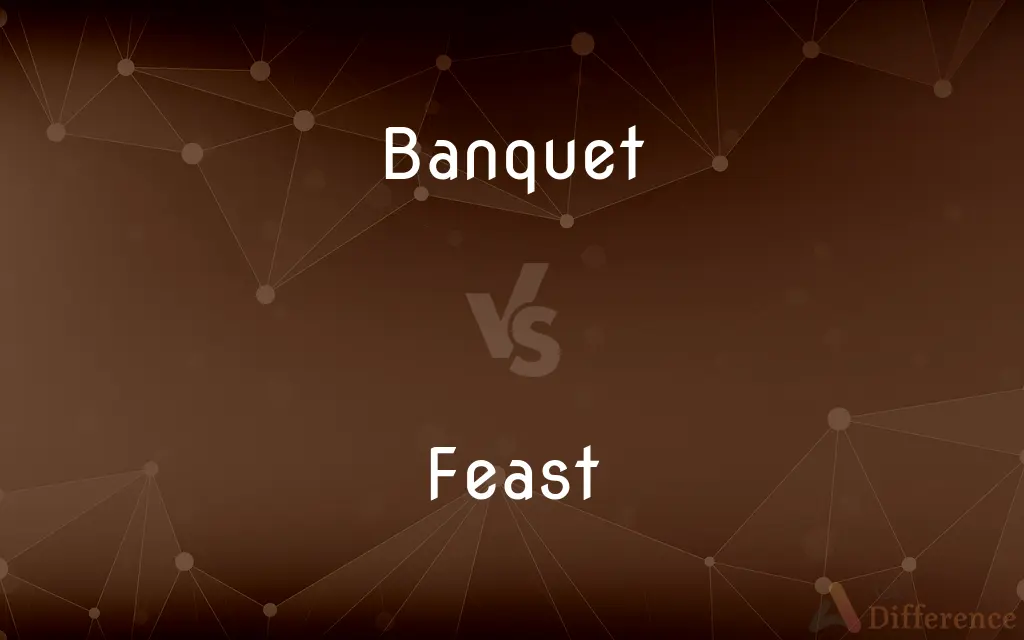Banquet vs. Feast — What's the Difference?
Edited by Tayyaba Rehman — By Urooj Arif — Updated on March 28, 2024
A banquet is a formal, elaborate meal served at events, often with a structured order, while a feast is a large, often lavish meal, typically celebrating a particular event or cultural tradition without strict formality.

Difference Between Banquet and Feast
Table of Contents
ADVERTISEMENT
Key Differences
Banquets are characterized by their formal setting and structured order, including multiple courses served to seated guests. These events are often associated with celebrations, ceremonies, or official gatherings, emphasizing elegance and protocol. In contrast, a feast is a celebratory meal that brings people together for religious, cultural, or familial reasons, focusing more on abundance and communal enjoyment rather than strict formality. Feasts are known for their generous portions and variety, aiming to create a sense of community and celebration.
While banquets are typically held in formal venues like hotels or banquet halls and follow a predetermined schedule, feasts can occur in various settings, from homes to outdoor communal spaces, and often incorporate specific traditions or dishes significant to the occasion or culture. This flexibility in venue and structure highlights the feast's emphasis on celebration and community over formality.
Banquets often require invitations and have a guest list, reflecting their organized and exclusive nature. They may feature speeches, presentations, or performances as part of the event. Feasts, on the other hand, are generally more inclusive, inviting broader participation from the community or family, and are less likely to involve formal invitations or a structured program beyond the meal itself.
The menu at a banquet is carefully planned and prepared, with attention to presentation and serving etiquette, catering to the event's formal nature. Feasts celebrate abundance and culinary tradition, offering a wide array of dishes that reflect the cultural or celebratory significance of the occasion, with less emphasis on presentation and more on variety and quantity.
Understanding the distinctions between banquets and feasts is essential in appreciating the diverse ways people come together to celebrate, commemorate, or honor significant events and traditions. While banquets emphasize formality and structure, feasts focus on abundance, tradition, and community engagement.
ADVERTISEMENT
Comparison Chart
Setting
Formal venues like banquet halls or hotels.
Various, including homes and outdoor spaces.
Structure
Structured order with multiple courses, often seated.
More flexible, focusing on communal enjoyment.
Occasion
Celebrations, ceremonies, official events.
Religious, cultural celebrations, or family gatherings.
Formality
High, with a focus on elegance and protocol.
Lower, with emphasis on abundance and tradition.
Participation
By invitation, often with a guest list.
More inclusive, often inviting broader community participation.
Menu
Carefully planned, with attention to presentation.
Focuses on abundance and variety, reflecting tradition.
Additional Features
May include speeches, presentations, or performances.
Emphasizes communal enjoyment, may incorporate traditions.
Compare with Definitions
Banquet
Often requires formal attire.
Guests at the banquet were dressed in evening gowns and tuxedos.
Feast
A large meal celebrating a particular event or tradition.
The village feast featured dishes that had been passed down for generations.
Banquet
Associated with official or ceremonial events.
The diplomatic banquet was attended by ambassadors and dignitaries.
Feast
Less formal than a banquet.
Guests at the feast wore casual attire and shared stories around the fire.
Banquet
A formal meal for many people, often in celebration.
The company hosted a lavish banquet to celebrate its 50th anniversary.
Feast
Can be part of religious or cultural ceremonies.
The feast of the harvest was marked by special prayers and sharing of food.
Banquet
Characterized by elaborate courses and service.
The wedding banquet included a five-course meal served to all guests.
Feast
Known for abundance and variety of food.
The holiday feast included an array of meats, vegetables, and desserts.
Banquet
Structured around toasts and speeches.
The banquet concluded with toasts to the newlyweds' future happiness.
Feast
Emphasizes community and sharing.
The feast was a time for the community to come together and give thanks.
Banquet
A banquet (; French: [bɑ̃kɛ]) is a formal large meal or feast, where a number of people consume food together. Banquets are traditionally held to enhance the prestige of a host, or reinforce social bonds among joint contributors.
Feast
A periodic religious festival commemorating an event or honoring a god or saint.
Banquet
An elaborate and formal evening meal for many people
A state banquet at Buckingham Palace
Feast
A large, elaborately prepared meal, usually for many persons and often accompanied by entertainment; a banquet.
Banquet
Entertain with a banquet
A banqueting hall
Feast
A meal that is well prepared and abundantly enjoyed.
Banquet
An elaborate, sumptuous meal; a feast.
Feast
Something giving great pleasure or satisfaction
A book that is a veritable feast for the mind.
Banquet
A ceremonial dinner honoring a particular guest or occasion.
Feast
To give a feast for; entertain or feed sumptuously
Feasted the guests on venison.
Banquet
To honor at or partake of a banquet.
Feast
To partake of a feast; eat heartily.
Banquet
A large celebratory meal; a feast.
Feast
To experience something with gratification or delight
Feasted on the view.
Banquet
(archaic) A dessert; a course of sweetmeats.
Feast
A very large meal, often of a ceremonial nature.
We had a feast to celebrate the harvest.
Banquet
A ceremonial dinner party for many people.
Feast
Something delightful
It was a feast for the eyes.
Banquet
(intransitive) To participate in a banquet; to feast.
Feast
A festival; a holy day or holiday; a solemn, or more commonly, a joyous, anniversary.
Banquet
(obsolete) To have dessert after a feast.
Feast
(intransitive) To partake in a feast, or large meal.
I feasted on turkey and dumplings.
Banquet
(transitive) To treat with a banquet or sumptuous entertainment of food; to feast.
Feast
(intransitive) To dwell upon (something) with delight.
Banquet
A feast; a sumptuous entertainment of eating and drinking; often, a complimentary or ceremonious feast, followed by speeches.
Feast
(transitive) To hold a feast in honor of (someone).
We feasted them after the victory.
Banquet
A dessert; a course of sweetmeats; a sweetmeat or sweetmeats.
We'll dine in the great room, but let the musicAnd banquet be prepared here.
Feast
To serve as a feast for; to feed sumptuously.
Banquet
To treat with a banquet or sumptuous entertainment of food; to feast.
Just in time to banquetThe illustrious company assembled there.
Feast
A festival; a holiday; a solemn, or more commonly, a joyous, anniversary.
The seventh day shall be a feast to the Lord.
Now his parents went to Jerusalem every year at the feast of the passover.
Banquet
To regale one's self with good eating and drinking; to feast.
Were it a draught for Juno when she banquets,I would not taste thy treasonous offer.
Feast
A festive or joyous meal; a grand, ceremonious, or sumptuous entertainment, of which many guests partake; a banquet characterized by tempting variety and abundance of food.
Enough is as good as a feast.
Belshazzar the King made a great feast to a thousand of his lords.
Banquet
To partake of a dessert after a feast.
Where they did both sup and banquet.
Feast
That which is partaken of, or shared in, with delight; something highly agreeable; entertainment.
The feast of reason, and the flow of soul.
Banquet
A ceremonial dinner party for many people
Feast
To eat sumptuously; to dine or sup on rich provisions, particularly in large companies, and on public festivals.
And his sons went and feasted in their houses.
Banquet
A meal that is well prepared and greatly enjoyed;
A banquet for the graduating seniors
The Thanksgiving feast
They put out quite a spread
Feast
To be highly gratified or delighted.
With my love's picture then my eye doth feast.
Banquet
Provide a feast or banquet for
Feast
To entertain with sumptuous provisions; to treat at the table bountifully; as, he was feasted by the king.
Banquet
Partake in a feast or banquet
Feast
To delight; to gratify; as, to feast the soul.
Feast your ears with the music a while.
Feast
A ceremonial dinner party for many people
Feast
Something experienced with great delight;
A feast for the eyes
Feast
A meal that is well prepared and greatly enjoyed;
A banquet for the graduating seniors
The Thanksgiving feast
They put out quite a spread
Feast
An elaborate party (often outdoors)
Feast
Partake in a feast or banquet
Feast
Provide a feast or banquet for
Feast
Gratify;
Feed one's eyes on a gorgeous view
Common Curiosities
How does a feast differ from a banquet in terms of setting?
Feasts are more flexible in setting, occurring anywhere from homes to outdoor spaces, unlike the formal venues for banquets.
What kind of food is served at a banquet?
Banquets serve carefully planned and presented courses, suitable for the event's formal nature.
What is the primary purpose of a banquet?
To celebrate, commemorate, or honor special occasions, often with a focus on formality and elegance.
Is formal attire required for a feast?
Not typically; feasts focus on communal enjoyment and tradition, with less emphasis on formality.
Can anyone attend a feast?
Feasts are generally inclusive, inviting community or family members, often without the need for formal invitations.
Do feasts always involve large quantities of food?
Yes, feasts are characterized by their abundance and variety, reflecting the celebration's communal spirit.
How are guests invited to a banquet?
Through formal invitations, which may include details about the event's dress code, location, and time.
Are speeches a common feature of feasts?
While not as common as in banquets, some feasts may include speeches, especially if tied to cultural or religious traditions.
Can banquets have themes?
Yes, banquets often have themes that guide the decor, attire, and sometimes the menu, to enhance the event's atmosphere.
Can a banquet be casual?
While banquets are generally formal, some may adopt a more relaxed approach, depending on the event or host's preference.
How do feasts contribute to community bonding?
By bringing people together in celebration, sharing, and appreciation of cultural or familial traditions.
Can a feast be part of a banquet?
Yes, a banquet can include a feast-like meal as part of the celebration, especially in cultural or religious contexts.
What makes a feast significant in cultural celebrations?
Feasts symbolize community, abundance, and gratitude, often incorporating traditional foods and practices.
What is the significance of the menu at a banquet?
It reflects the event's sophistication and elegance, often tailored to the guests' tastes and the occasion's significance.
How do traditions influence a feast?
Traditions define the foods, rituals, and the overall spirit of a feast, connecting participants to their cultural or religious heritage.
Share Your Discovery

Previous Comparison
Colt vs. Foal
Next Comparison
Keel vs. RibAuthor Spotlight
Written by
Urooj ArifUrooj is a skilled content writer at Ask Difference, known for her exceptional ability to simplify complex topics into engaging and informative content. With a passion for research and a flair for clear, concise writing, she consistently delivers articles that resonate with our diverse audience.
Edited by
Tayyaba RehmanTayyaba Rehman is a distinguished writer, currently serving as a primary contributor to askdifference.com. As a researcher in semantics and etymology, Tayyaba's passion for the complexity of languages and their distinctions has found a perfect home on the platform. Tayyaba delves into the intricacies of language, distinguishing between commonly confused words and phrases, thereby providing clarity for readers worldwide.














































